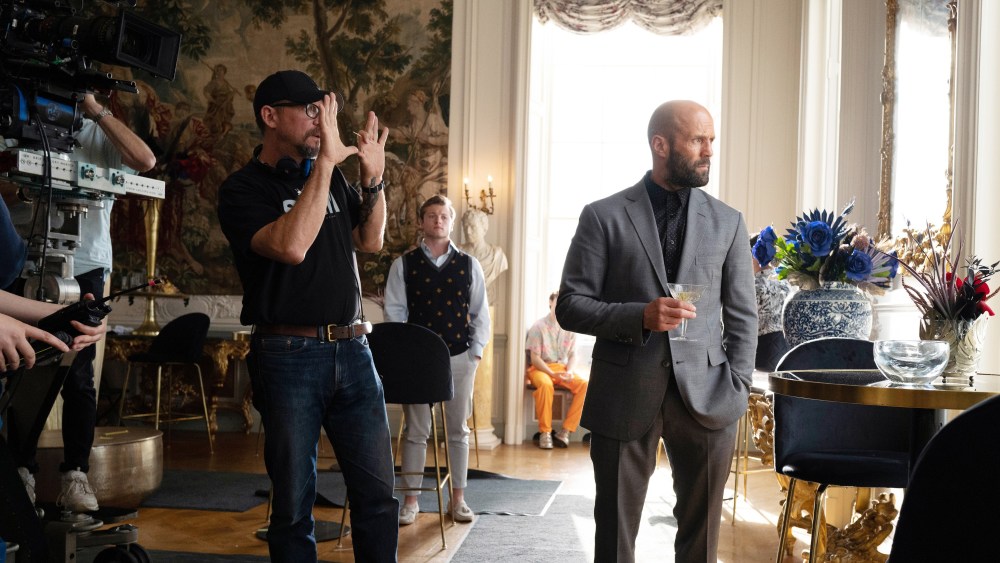The Beekeeper’s Josh Hutcherson, David Ayer Talk Stunts, Sequel Plans
SPOILER ALERT: This article discusses mild plot points in the new movie “The Beekeeper.”
David Ayer‘s new film “The Beekeeper” is an action movie extravaganza that’s reminiscent of the best Schwarzenegger and Stallone flicks of the ’80s. Jason Statham stars as Adam Clay, a man who seeks vengeance on the call center that scams one of his friends (played by Phylicia Rashad). Unfortunately for the criminals, led by nepo baby tech bro Derek Danforth (Josh Hutcherson), Statham has a secret past that makes him an ass-kicking machine.
Ayer and Hutcherson broke down our burning questions about this blood and honey-soaked extravaganza.
Why did you want to take on “The Beekeeper” as your next action movie?
DAVID AYER: It was an opportunity to work with Jason. The script itself had the magic elements, like a story that has amazing twists and a sense of heart that is hard to find in these movies. It has this slow-burn emotional opening, so by the time Jason activates and starts punching people, you’re really with him. As an actor, I felt like that’s what he needed so much: to be just a little bit more human, a little bit more accessible to the audience.
When working with Statham, what does he bring to the table that sets him apart from other actors?
AYER: Jason’s a classic movie star, and I think it’s something you’re born with. There’s only a handful now of true movie stars. You can’t explain it, but you know it when you see it. He just knows his light, his angles, his lenses, the camera blocking. So for me, it’s just, “How do I service that? How do I amplify what’s already there?”
He does his own stunts, he’s an athlete. He has so much action history, so much physical ability, and an understanding of how to make it look good on camera. I’ve done a lot of action, but he took me to school. But off duty, Jason is a nice, normal, down-to-earth dude.

THE BEEKEEPER, Josh Hutcherson, 2024. ph: Daniel Smith /© MGM /Courtesy Everett Collection
©MGM/Courtesy Everett Collection
How were you able to find the humanity in playing such an evil guy like Derek Danforth?
JOSH HUTCHERSON: Everybody’s got an inner Derek. It’s interesting: I think Derek sees himself as a hero of sorts, which is wild. That’s kind of a thing that David and I were constructing when designing Derek. I think just making somebody bad without any real base of understanding could be fun to watch, but it doesn’t feel truthful. We tried to give him a base where he lives in a warped reality that he’s created. He thinks that he deserves more respect and appreciation for what he’s accomplished. But he’s so privileged, so rich, so out of touch, and under the influence of a lot of different substances — he doesn’t see the reality around him.
Derek is often antagonizing his lackey, the overqualified fixer Wallace Westwyld, played by Jeremy Irons. You’re both in character, but was it still strange to start filming and have to berate an Oscar-winning legend?
HUTCHERSON: Going into it, I thought, “How’s he going to take it?” Because talking with David I knew there was going to be a lot of improv, and I might say some things to him that aren’t in the script that he might not like to hear. But he was a good sport. He’s not somebody who’s probably very used to people talking to him that way, so I think he enjoyed it too. But it was intimidating…I mean, it’s Jeremy Irons!
Did you all talk about potential sequel ideas on set?
AYER: We really, really, really want to make a sequel. We had a lot of fun. It’s a great world. We saw this crack in the door into the “Beekeeper” world. Everybody wants to know more. I want to know more, Jason wants to know more. And Adam Clay is such a great character. There are so many threads to unpack of what happened and why it happened. So I think it lends itself to be a great, fun franchise.
Both Adam Clay and John Wick are retired from elite secret assassin organizations and are hell-bent on revenge. Who would win in a 1:1 fight?
AYER: [long pause] I’m afraid to even answer that. [laughs]
David, your IMDb is filled with some ambitious upcoming projects. It says you’re writing and directing a “Dirty Dozen” remake, as well as writing remakes of “Commando” and “The Wild Bunch.” What are you focused on next?
AYER: They’ve been on the page a minute. I’m just trying to figure out where I’m going right now. “Dozen” has been in development for a bit, and it’s just trying to find the right angle for that one.
How do you manage the pressure of taking on these classic films?
AYER: It’s nerve-racking, to be honest. I have so much respect for cinematic history, and these are all projects that I grew up loving before being a filmmaker. I think that’s always the challenge of these things: How do you modernize something and build it out for a modern audience, while at the same time keeping that DNA? You see how different filmmakers deal with the same problems in different ways.

